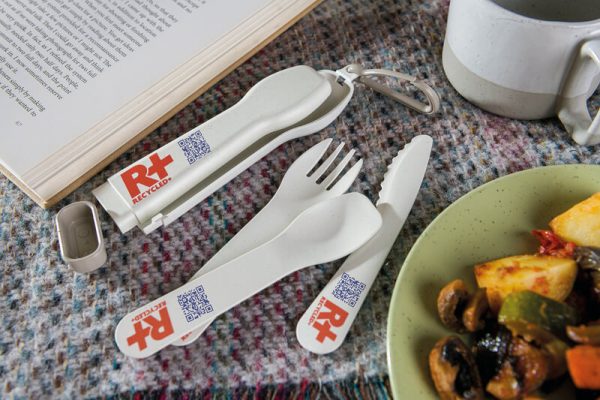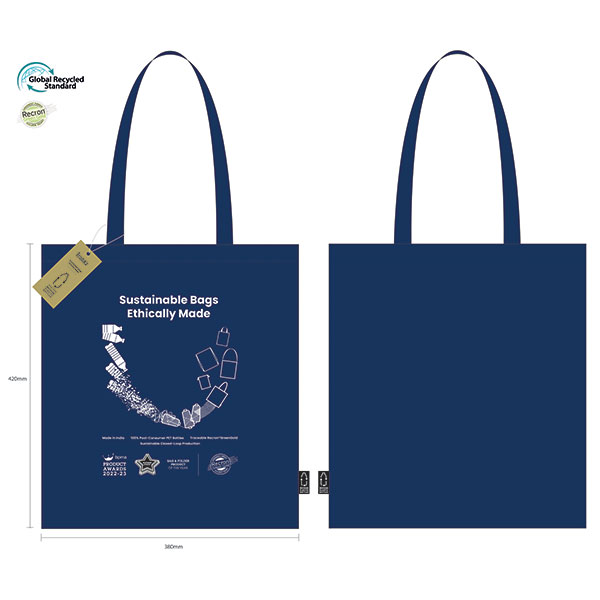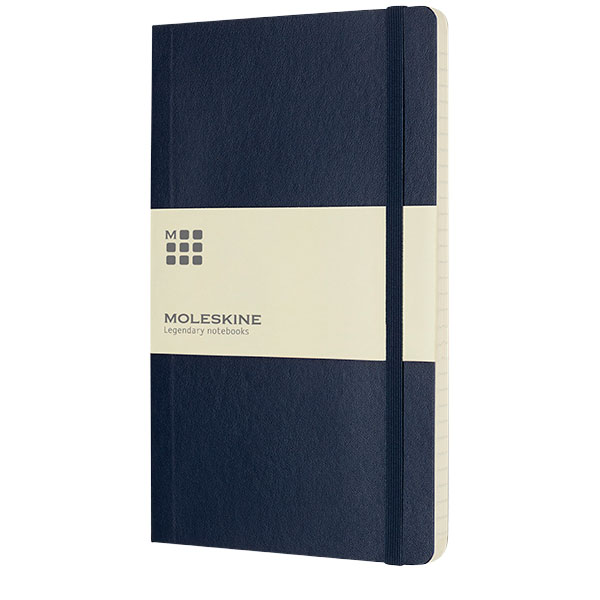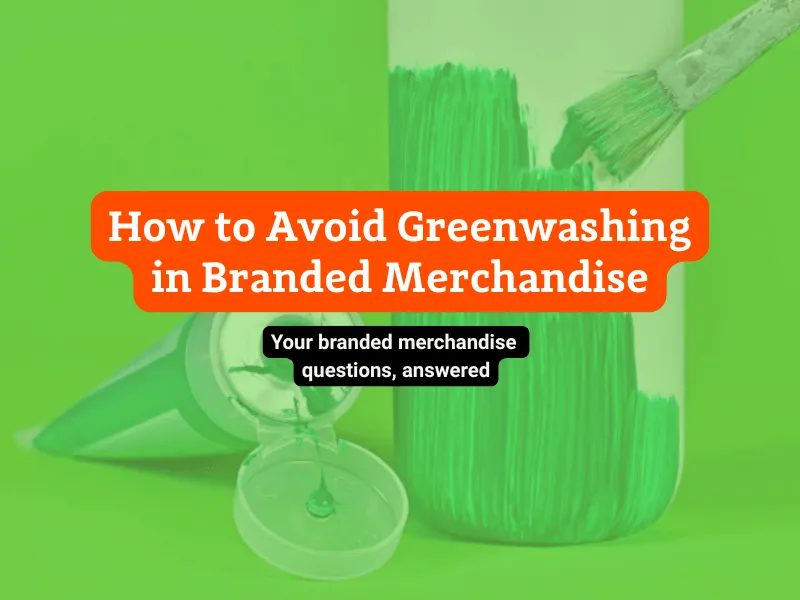Sustainability is a major priority for businesses – and naturally, branded merchandise has followed the trend. But with so many “eco”, “green” and “planet-friendly” claims out there, it can be hard to know which products are genuinely sustainable, and which ones fall into the trap of greenwashing.
In this week’s Branded Products Minute, Managing Director James Biggin explains how we help clients navigate sustainability claims without the confusion.
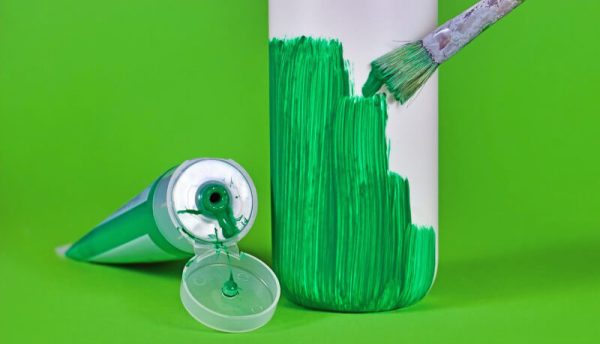
Below, we expand on the key points from the video, including how to choose sustainable items responsibly, how to avoid greenwashing, and how to make meaningful choices for your next campaign.
Browse our Sustainable Branded Products here.
What Sustainability Should Mean in Branded Merchandise
Sustainability isn’t one single feature, it’s a spectrum. And different businesses value different things. A product might be described as:
- Recycled
- Recyclable
- Reusable
- Biodegradable
- Compostable
- UK-made / EU-made
- Carbon-neutral
- Made with water-based or low-impact inks
- Produced in a certified factory (FSC, GOTS, OEKO-TEX, GRS)
…but each of these comes with different environmental impacts, benefits and trade-offs. That’s why the starting point is always the same: what does sustainability mean to you? Some teams want simple, practical sustainability: reusable bottles, recycled notebooks, or UK-made products with fewer transport miles. Others need full transparency: traceable materials, audited supply chains, certified inks and coatings, or low-carbon manufacturing.
Once we understand your priorities, whether that’s reusability, recycled content, certifications, local manufacturing, or carbon reduction, we can tailor product suggestions that genuinely align with those goals (and avoid greenwashing along the way).
Why Greenwashing Happens
Sustainability is now a buying expectation – which is great, but it also means products are sometimes marketed with broad, vague or exaggerated claims. Greenwashing often looks like:
- “Eco-friendly!” with no further detail
- “Recycled” but no percentage given
- “Sustainable” when the product is mass-imported with no certification
- “Compostable” that only works in industrial facilities, not at home
- Green icons that look official but aren’t
- Natural wording used when only 10–20% of the product is natural
Most greenwashing isn’t intentional. It usually happens when sustainability terms are used loosely or without enough explanation. That’s why we always base our recommendations on evidence, traceable supply chains, reputable manufacturers, and third-party certifications verified through the BPMA and UK/EU standards.
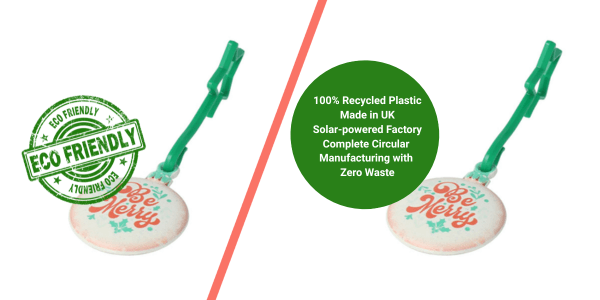
A recent BPMA insight study (surveying people aged 18–40) highlights just how damaging greenwashing can be:
-
51% understand the term greenwashing, while 35% don’t, and 14% have never heard it.
(Meaning many buyers rely on suppliers to explain sustainability clearly.) -
When shown an official definition of greenwashing, 78% said they would reduce or completely stop buying from a brand caught doing it.
(A major business risk for anyone overstating environmental claims.) -
55% said they would pay more for products where the environmental claims can be evidenced or traced.
(Clear proof matters more than broad eco-labels.) -
Confidence in identifying genuine environmental claims is mixed:
• 6% feel very certain
• 30% feel somewhat certain
• 33% feel uncertain
(Buyers want clarity and simplicity, not jargon.) -
77% believe government intervention is important in tackling greenwashing, with a third of these (35%) saying it is very important.
(Regulation is becoming expected, not optional.)
These figures show why transparency is essential, and with 78% saying greenwashing would impact their purchasing behaviour negatively, it can affect both your credibility and long-term customer relationships.
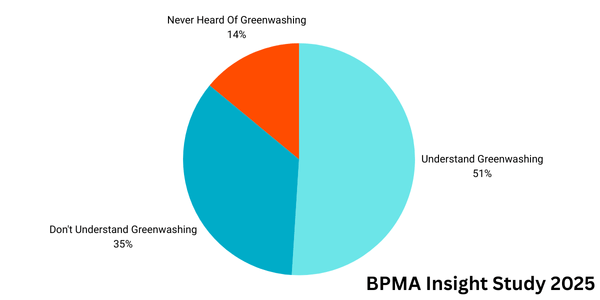
That’s why at Steel City, even though our website sometimes uses short terms like “eco”, “recycled” or “sustainable” for practical browsing, we always disclose full details (percentages, certifications, origin and materials) upon enquiry, so your choices are based on clear, honest information.
How to Avoid Greenwashing When Choosing Sustainable Branded Products
We never assume what “eco” means for you. Instead, as James describes in the video above, we follow these three key steps with every eco enquiry:
1. We clarify your definition of sustainability
Before recommending any products, we identify what matters most to you:
- Reusable products to reduce waste
- Recycled or part-recycled materials (RPET, recycled plastic, recycled card)
- Renewable or plant-based materials
- UK-made or European-made items to reduce transport emissions
- Biodegradable or compostable materials
- Verified certifications (FSC, GOTS, GRS, OEKO-TEX, carbon-neutral factories)
- Lower carbon footprint across fulfilment
- Alignment with internal CSR/ESG goals
There’s no “right” version, only what is right for your brand, values and campaign.
2. We’re honest about trade-offs
Even well-intentioned eco-plans can go off track. Here are some examples we walk through with customers:
- A recycled plastic pen made in the Far East → recycled content, but high transport emissions.
- A biodegradable item → but only biodegradable in industrial facilities.
- A “natural” product → but only one small part is natural.
- A product labelled “eco” → without evidence, standards or transparency.
- UK-made vs Far East → sustainability vs cost vs timelines.
- A carbon-neutral factory → vs a non-certified one with cheaper pricing.
This is where our expertise really supports your decision-making, balancing sustainability, budget, timelines, purpose and carbon footprint so you can choose confidently.
3. We recommend items that genuinely meet your sustainability goals
We match your priorities with verified options, thanks to longstanding supplier relationships and BPMA-backed compliance. We can source:
✔ UK-made options: Lower transport impact, shorter lead times, strong supplier traceability.
✔ European-made products: Often produced in carbon-neutral factories, using eco inks or renewable energy.
✔ Verified recycled-content products: Items made from RPET, recycled aluminium, recycled cotton, recycled paper.
Read more in our guides to: Recycled Promotional Products and RPET Promotional Products
✔ Reusable products built for longevity: Bottles, notebooks, bags and tech accessories designed to be used for years.
✔ Products made from natural or lower-impact materials: Cork, wheat straw, sugarcane bioplastics, FSC-certified paper, seeded paper.
The key is not to assume that any green-looking product is sustainable, and by tapping into our expertise, we can guide you to the right choice for your brand.
Practical Examples
Here are real scenarios James referenced in the video above:
You ask for a recycled pen.
We check:
- Where it’s made
- The % of recycled content
- Transport emissions
- Whether a UK/EU alternative exists
You need items with full traceability.
We look into:
- Certified suppliers
- Transparent material origins
- European-made production
- Carbon-neutral factories
You prefer reusability over recycled content.
We recommend:
- Durable bottles
- Refillable notebooks
- Long-lasting bags
- Pens with refillable ink cartridges
Our goal is to present the best-fit sustainable options with no greenwashing.
Sustainability & Greenwashing Reference Table
| Label | What It Should Mean | Greenwashing Risks | What to Ask |
|---|---|---|---|
| Recycled Content | Uses recycled materials | No % given | What % is recycled? Is it Certified? |
| Biodegradable | Breaks down safely | Only industrially compostable | Home or industrial? What is the Timeframe? |
| Compostable | Turns to organic matter | No certification | Is it EN 13432 or OK Compost certified? |
| Reusable | Designed for multiple uses | Poor durability | Expected lifespan? Safety tested? |
| UK/EU Made | Lower transport footprint | Assumed to be “eco” | What materials? Which certifications? |
| Plant-Based | Uses renewable material | Only part of product is plant-based | What %? Sustainable sourcing? |
| Carbon Neutral | Emissions measured & offset | No evidence | Who certified the claim? |
| Natural Materials | Low-impact raw materials | No sustainable certification | Is it FSC/GOTS/GRS/OEKO-TEX? |
FAQs
Is recycled branded merchandise always better?
Recycled branded merchandise isn’t always the better choice. Recycled content matters, but so does transport distance, durability, and end-of-life options.
Are UK-made items more sustainable?
Often UK-made items are more sustainable, thanks to lower emissions, better traceability and stronger working standards. But what it is made of and the durability of the item should also be considered.
Is biodegradable a good choice?
Biodegradable items are a good choice, if they biodegrade under real-world conditions (not just industrial plants).
Can sustainable merchandise still be high quality?
Yes, sustainable products are often more durable, especially UK- or EU-made items.
How do I avoid greenwashing when choosing merchandise?
To avoid greenwashing, ask where the product was made, what it’s made of, and what the environmental trade-offs are. We can walk you through this.
Do sustainable products cost more?
Sustainable products can cost more, but with growing demand, these costs are coming more inline with the average cost. UK and European-made products can be cost-effective depending on quantity and print method.
Conclusion
Sustainability in branded merchandise isn’t about ticking a single box, it’s about honest choices. Whether “eco” means recycled, reusable, UK-made or fully traceable, we’ll help you make decisions that genuinely align with your environmental goals.
If avoiding greenwashing is important to your organisation, we’re here to guide you through the options clearly and transparently. Contact our team here.
